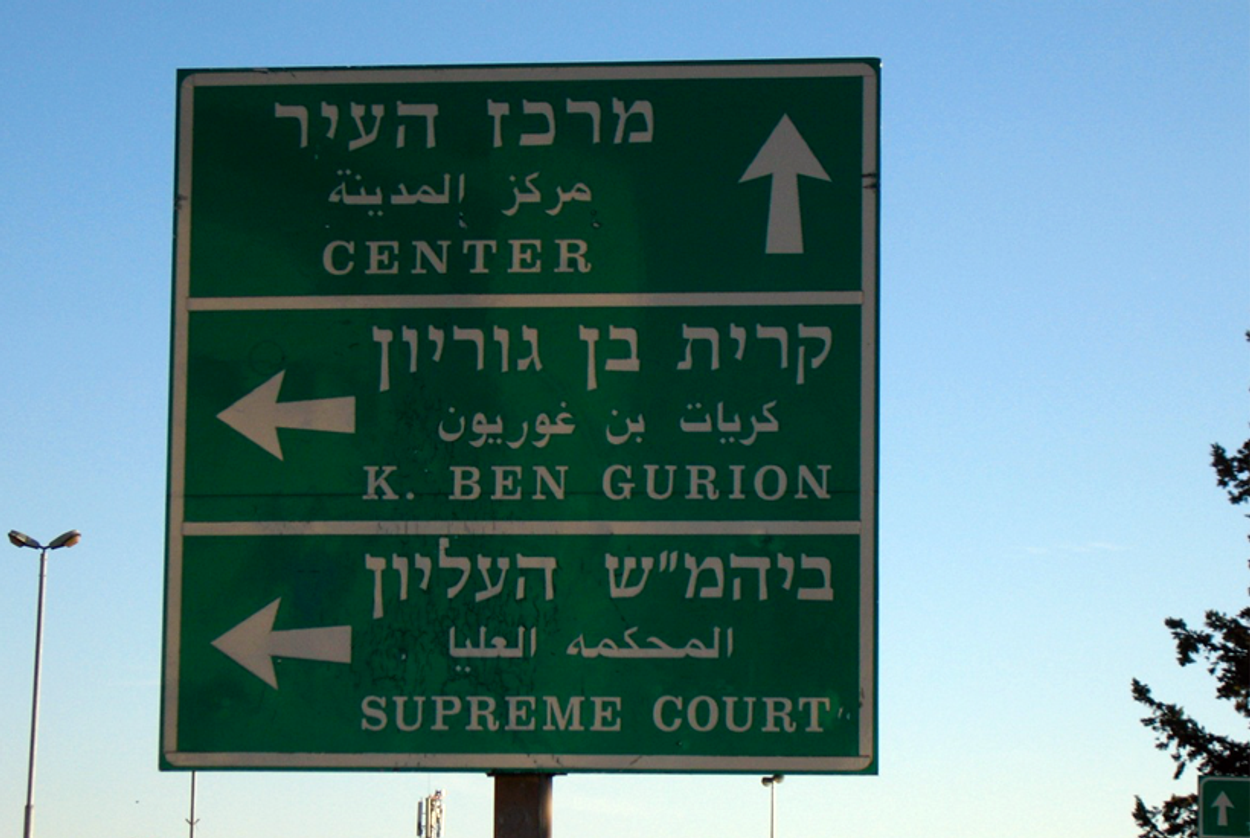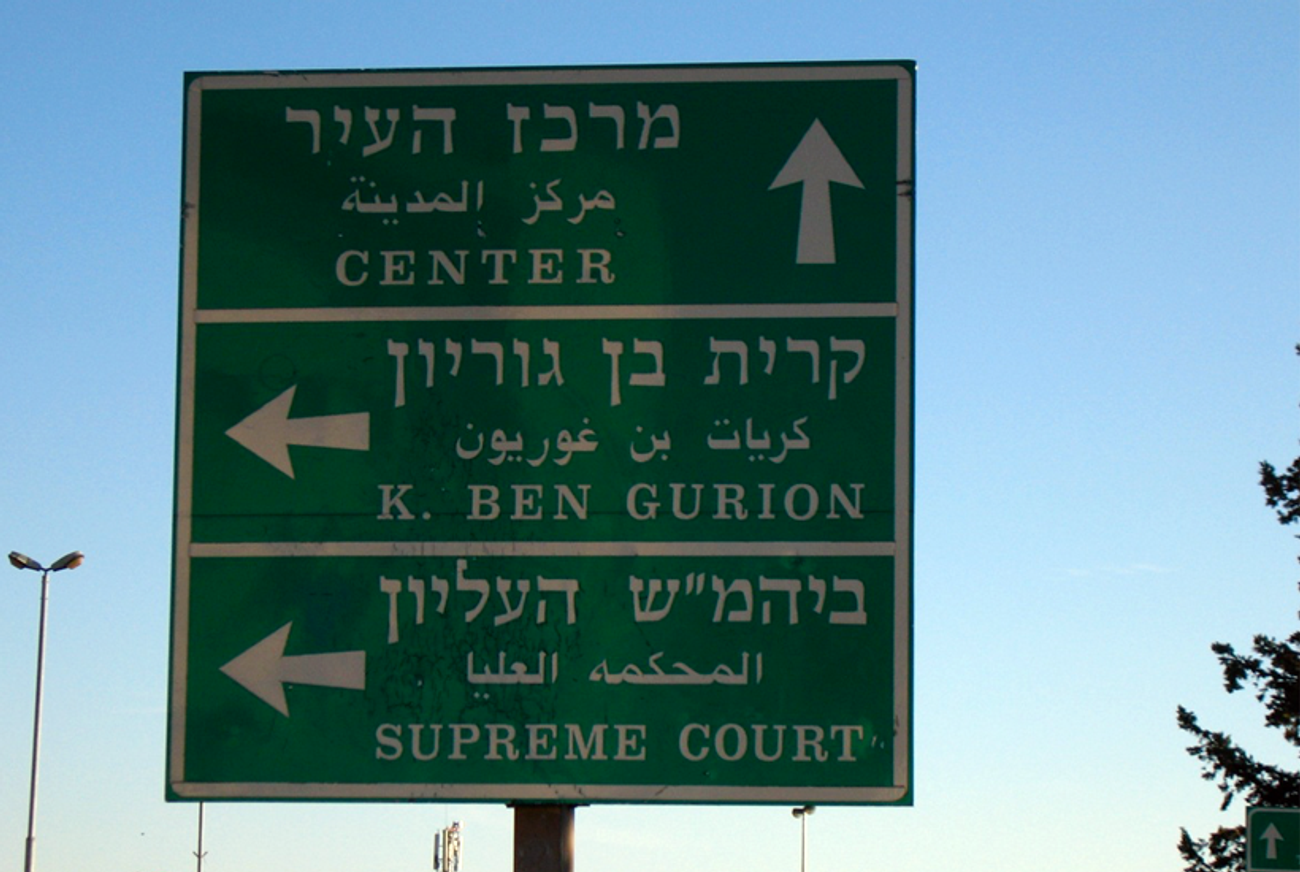Should Hebrew Be Israel’s Official Language? Has It Ever Been?
A new piece of legislation seeks to upset the status quo over which language the Jewish state deems official. It’s deeply misguided.




The Knesset, its break postponed due to the war in Gaza, is wrapping up its summer session with a bang: Late last month, a small group of legislators began promoting a bill that would designate Hebrew as the Jewish state’s sole official language.
“In most nations in the world, the official language is that which is spoken by the majority of the population,” says the bill. “Therefore, in Israel, Hebrew has a status that ought to be cemented into law. Passing this bill will contribute to the social cohesiveness in Israel, as well as to constructing a collective identity necessary to create mutual trust and preserve the values of democracy.”
To the bill’s detractors—a surprising coalition that includes liberal politicians and old-school Likud lions like Israel’s current president, Reuven Rivlin, and former minister of defense Moshe Arens—all this talk of cohesiveness and collective identity was just Newspeak intended to dull the bill’s true purpose, namely, demoting the status of Arabic as Israel’s other official language. Conferring any special status on Hebrew, these critics argued, was nothing more than a cheap political provocation aimed at upsetting the already deeply tense relationship between Israeli Jews and Arabs.
As is so often the case with ideologically tinged disputes, the current brouhaha obscures deeper—and more pressing—realities.
First of all, Arabic is not an official language in Israel. Neither is Hebrew: Like so much of Israel’s legal code, this issue, too, rests on ordinances passed by the Mandatory British government in Palestine. According to Article 82 of the Palestine Order in Council, passed in August of 1922, “All Ordinances, official notices, and official forms of the Government and all official notices of local authorities and municipalities in areas to be prescribed by order of the High Commissioner, shall be published in English, Arabic, and Hebrew. The three languages may be used in debates and discussions in the Legislative Council, and, subject to any regulations to be made from time to time, in the Government offices and the Law Courts.”
Because it stops short of declaring any language official, court cases parsing Article 82 after the establishment of the State of Israel in 1948 came to two key conclusions. The first was that there can be little doubt that the Mandatory government fully intended for Arabic to be considered an official state language. The second pertained to the meaning and usage of an official language. To take Article 82 at its word, we should define an official language as one in which citizens can file grievances, one that parliamentarians can use in addressing the plenum, and that the state uses in its official documents. When court cases challenging the Mandatory status quo started trickling in, Israeli judges held these considerations in mind, protecting Arabic’s status as an official language in some cases but strongly denying it in others.
The Adalah case is a perfect embodiment of this nuanced approach. In 1999, Adalah, the Legal Center for Arab Minority Rights in Israel, alongside the Association for Civil Rights in Israel, filed a petition against a host of mixed-population municipalities—cities and towns like Ramle, Lod, Akko, and Tel Aviv-Yaffo shared by Jewish and Arab residents—demanding that they add Arabic to all traffic, street, and other signs conveying necessary information. The Supreme Court found in favor of the petitioners, ruling that all local authorities whose Arab populations were larger than 6 percent were obligated to have Arabic on their signs. But the decision, the court took care to clarify, did not constitute a precedent concerning Arabic’s overall status as an official language. Put simply, the Adalah case—like most of the precedents and pieces of legislation before it or since—recognizes Arabic to be the language of a sizable minority and requires that this minority be given adequate information and access whenever it is directly concerned, but it also recognizes that most of the affairs of the state at large are conducted exclusively in Hebrew, giving it primacy over any other language. This is why election ballots, for example, must contain Hebrew letters clearly marking the names of candidates or political parties; writing in Arabic is common but not mandatory.
Those members of Knesset who now wish to crown Hebrew the state’s language, then, are merely asking to make official what is already—in practice and in precedent—the law of the land. And those thundering against the new bill are overlooking a much more dire threat: Earlier this year, Shai Piron, Israel’s minister of education, announced a significant reduction in the number of hours devoted to Arabic in Israeli schools. According to his reform, slated to take effect soon, Israeli students will only learn Arabic between seventh and ninth grade, a one-year reduction that would almost certainly deliver a critical blow to the state of Arabic as a high-school subject. Last year, for example, while 150,000 Israeli teenagers took their Bagrut, or matriculation exam, in English, fewer than 10,000 did so in Arabic. Also, of all of Israel’s high schools, only 40 required that tenth-graders study Arabic, with only 200 more offering the language as an elective.
Rather than quibble over the largely meaningless symbolism of official languages—meaningless because the law provides enough protection against language-based discrimination to non-Hebrew speakers—anyone who truly cares about Arabic’s status should rally against its disappearance from Israel’s schools. Politics aside, a nation with a large Arabic minority, firmly planted in a region that speaks, writes, sings, and dreams in Arabic, should do everything in its power to make sure its sons and daughters speak the language as well. Whether you believe that Israel should make an effort to reconcile with its Arabic-speaking neighbors or engage them in a protracted war of self-defense, speaking the language is key. And Israel should be confident enough to understand that while Hebrew, a miracle of a modern linguistic revival, should be celebrated and protected and upheld, being able to speak to another person in his or her language or read Naguib Mahfouz in the original or tune in to what those dissidents are posting online from Cairo to Tunis will only make life richer.
***
Like this article? Sign up for our Daily Digest to get Tablet Magazine’s new content in your inbox each morning.
Liel Leibovitz is a senior writer for Tablet Magazine and a host of the Unorthodox podcast.
Liel Leibovitz is editor-at-large for Tablet Magazine and a host of its weekly culture podcast Unorthodox and daily Talmud podcast Take One. He is the editor of Zionism: The Tablet Guide.